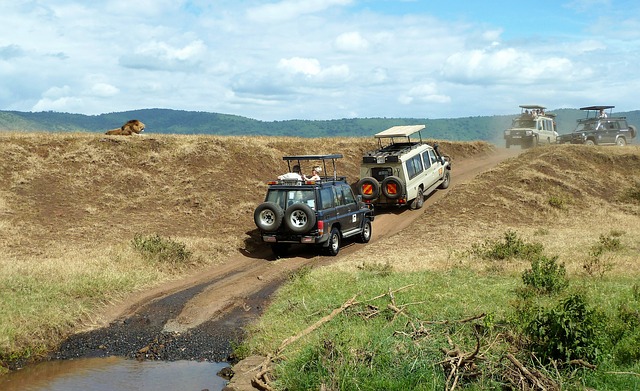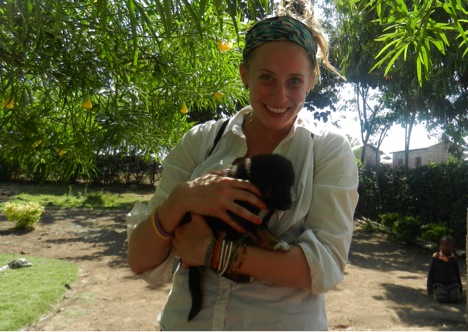Tired of Being Mzungu in Tanzania

I leave Tanzania in three days and it’s time to go. It’s been three months of cold showers, upset stomachs, and tough lessons, perhaps the toughest of which was this: I will forever be a tourist here. No matter how long I stay or how many local kids I love or how good my Swahili gets, I will never fit in. I can’t escape the label that my skin sticks bright and clear on my forehead. I am just a mzungu, only a white person.
That’s all there is to me. I am not a friend, not an enemy, sometimes not even a fellow human, but a representation, a generalization, water to oil. I am here to give things: my time, money, toys and clothes. These things are my identity.
A few times a week a volunteer like me, walking innocently along, not bothering anyone, is approached by kids or grown-ups (usually kids) who hold out a flat palm and demand in a hard voice, “Give me my money!” First of all, none of us carry large amounts of money with us because a) we don’t have much – we’re volunteers, remember? – and b) we might get mugged.
The habit of expecting money from mzungus is engrained in their culture. Somebody taught them this, and that somebody is not going to teach them otherwise.
Our standard response is to imitate them: we hold out our hands and say, “You give me my money!” But it never does any good. The habit of expecting money from mzungus is engrained in their culture. Somebody taught them this, and that somebody is not going to teach them otherwise.
As far as I can tell, the confusedness of race relations here for the most part stems from nothing more hostile than ignorance, passed down through the generations. There were maybe two or three Tanzanians on my flight from Amsterdam to Kilimanjaro; the rest of us were American or European tourists. Whereas in the west travel for leisure is a popular pastime, the majority of Tanzanians cannot afford such a hobby.
I don’t think they get out of their country much, and especially not off their continent.
Most of them don’t have televisions, cutting off access to documentaries and international news channels. They must eventually study history or geography in school, but I have no idea whether the national curriculum includes any study of Europe or Asia, for example, or North America.
No, I am not rich. I’m not poor like you, but I’m not rich like you think I am. One of the things I’m most looking forward to about going home is getting away from all the attention people pay us in the street here due one hundred percent to the color of our skin.
I know that my students didn’t even know Tanzania was part of Africa, so I’m not holding out much hope for the existence of vast world knowledge on their part. Due probably in part to this lack of understanding, everything is black and white to most Tanzanians I’ve encountered – literally black and white.
No, I am not rich. I’m not poor like you, but I’m not rich like you think I am. One of the things I’m most looking forward to about going home is getting away from all the attention people pay us in the street here due one hundred percent to the color of our skin. I often walk part of the trip to and from work with other volunteers.
Daladala conductors grab our wrists; taxi and bodaboda drivers shout after us offering rides; we hear hisses, catcalls, whistles, shouts.
Generally I choose not to respond, a habit acquired from months of receiving this treatment. If I’m in a good mood I’ll offer a simple, quiet greeting and/or a small smile in return.
Mostly people just holler “Mzungu!” or “Hey ‘zungu!” Generally I choose not to respond, a habit acquired from months of receiving this treatment. If I’m in a good mood I’ll offer a simple, quiet greeting and/or a small smile in return. Always dissatisfied, they keep yelling. They shout harshly at my back after I walk past: “Mzungu! Mzungu! Ay, mzungu! ‘Zungu! MA-ZUNG-U!”
These are not hostile greetings, but neither are they friendly; locals speak to me on the street in exactly the kind of tone you might use with a disobedient dog named Mzungu.
Our natural first reaction is to think, “Would you like it if you were walking down the street and I yelled ‘hey, black person!’ at you? Because it’s the same thing.” I want to inform these people that I do have an actual name, and it is not “mzungu.” That word’s definition encompasses, in my opinion, only a small portion of my identity – but to them, it’s all I have to offer. For this reason and for the manner in which it is often delivered, I’ve come to find it offensive.
I think that while it is not intended as such on every occasion, “mzungu” definitely crawls with shades of not-so-nice connotations, especially used, as one volunteer heard it, in the context of a hospital delivery room.
I think that while it is not intended as such on every occasion, “mzungu” definitely crawls with shades of not-so-nice connotations, especially used, as one volunteer heard it, in the context of a hospital delivery room. Women here give birth without much medication and if they scream or cry during labor, they’re mockingly called mzungus. That’s funny because it’s true, but not so flattering, hm?
Frankly, I have never in my life been on this end of racism and I hate it. But after I have time to cool down after particularly frustrating incidents, I consider that perhaps it’s good for me to feel this way, to be treated like this. I understand that people with so little might feel resentful of people with so much that they can afford to give it away, who can afford to work for free.
And so many people every day all over the world fall victim to abuse because of the color of their skin, but rarely does this happen to white people – we’re overdue for a little battering around, you might say. I’ve found that I don’t handle it as gracefully as I should.
I’ve found that I’m ready to go home and not hear that grating, segregating word ever again.

Tired of Being Mzungu in Tanzania
Related Reading
- Zanzibar Tourism: Describing My Home to the People of Zanzibar
- Girls Getaway to Zanzibar
- Volun-touring Versus Volunteering in Zanzibar
- The Truth About Zanzibari Men
- I Buried My Heart in Zanzibar
Have you traveled to Tanzania? What were your impressions? Email us at editor@pinkpangea.com for information about sharing your experience and advice with the Pink Pangea community. We can’t wait to hear from you.
Tired of Being Mzungu in Tanzania top photo credit: pixabay









I am Tanzanian.
When i was a kid i used to call whites men wazungu too, without bad intention and i believe other Tanzanians do the same especial uneducated ones.
they just think its normal and right to do so. when i was in form six i realis that whites people hate that name because one of my teacher comes from america and told me that can you ask other student to stop calling me that name, can you imagine at that time i note that he feels bad about that name.
Oh, I really like your article. Now I’m in Tanzania and this is exactly how I feel.
I found one solution. Well, it’s not perfect but still better than nothing. I’ve joined a gospel choir and I’m practicing and singing with them. Only one of the people speaks English, but when you sing the language doesn’t matter.
Otherwise I’m just a mzungu or – what’s even worse – simply walking white ATM… !
Perhaps I was luckier, but I found the use of ‘mzungu’ to be good-natured, and the children who yell out ‘give me money’ seem to be aware that they’re being cheeky, sort of like a 3 year-old who swears, sees the reaction of adults, and decides it’s a great way to gain attention. Admittedly there were one or two teenage boys who seemed to think they may actually succeed with the ‘give me money approach, but they’re in the minority.
As for touts, ripoff prices, and the walking wallet sensation, you can’t tell me that this hasn’t happened elsewhere overseas. I’ve seen it being used in wealthy countries, and even here at home on unsuspecting tourists.
On the whole, however, I felt that 99.95% of locals treated me as an equal. Tanzanians are just as likely to invade one another’s personal space, especially on dalladallas, where any such concept is left at the door, conductors pushing passengers to the back or grabbing passengers by the arm is not limited to wazungu.
All said, I hope you still had a wonderful time, some of my most cherished memories are from my time over in Tz, and I have no doubt that there are many, many people who are grateful for what you have given, and I trust that you have left a good impression on those you met in your day-to-day living ober there.
Three months isn’t very long! Not long enough to state that if you stayed you would always be a tourist here in Tz. Try speaking with someone like my Aussie colleague who’s been here 7 years. It would be insulting to her (and her local hubby and kids) to suggest she was a tourist. Things take time – from past experience it’s taken me around 2 years to feel at home in any new country/city. Five months in I’m just starting to feel comfortable here.
Meanwhile, I also don’t enjoy the constant ‘Mzungu’ but 80% of the time it seems innocent, and I love all the high fives and random cuddles I get from kids when I’m out running (that doesn’t happen back home!). I find the best way to head off trouble is to pre-emptively greet everyone and give them a smile > you get back what you put out into the universe. I’ve only had one kid ask for money and I laughed and gave him a big HAPANA SANA.
I lived in Tanzania for over a year and left with a deep sadness, feeling like I was leaving my new home, family and friends behind. After a month or so in TZ, not a single person called me mzungu, and I think that is primarily because I tried to immerse myself in their culture. I ate the same food, listened to the same music, watched the same movies (YES – they have movies, which also means they have TVs) and hung out at the same local spots. I gained meaningful relationships with friends that I still keep up with, some daily. I feel terrible that you left with such distasteful things to say about a country filled with some of the most welcoming and kind people I’ve ever met. I honestly believe your bad experience in Tanzania stems from something more personal rather than an entire country. For anyone who reads this blog in hopes to gain a little insight into Tanzania – This is NOT an accurate view of life in TZ. My advice to anyone traveling there is to get to know the people you’re around. Share a plate of ugali with the locals, hang out, find out the latest gossip – don’t separate yourself. You’ll find that we are SO much more similar than we are different.
Amanda – You are a mzungu. You’re right, you will always be a tourist in Tanzania and that’s a position you put yourself in.